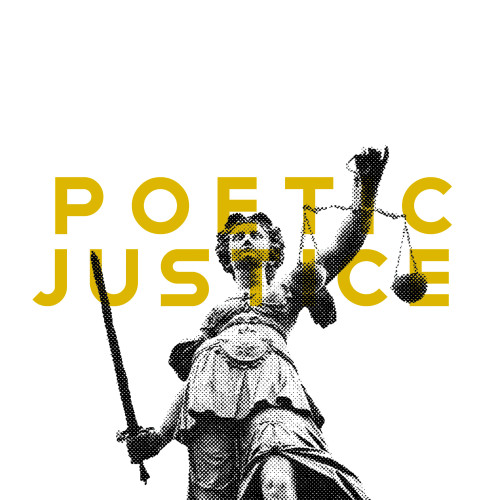
Incarcerated women find voice, hope, and freedom through writing
From Oklahoma Humanities Spring/Summer 2019 Issue JUSTICE (Pages 23 - 29)
Oklahoma has the highest incarceration rate in the entire world. The state houses 1,079 of every 100,000 residents (Prison Policy Initiative), compared to the national average of 698 people per 100,000 (Oklahoma Policy Institute). And our state is especially hard on women.
Read the rest at: https://www.okhumanities.org/news/spring-summer-2019-justice

Tulsa students receive responses after writing letters to incarcerated women
After studying Martin Luther King Jr's famous letter from Birmingham jail, a group of Tulsa students wrote their own letters to women imprisoned in McLoud, Okla.
Jefferey Donaldson's 10th grade English class at the Tulsa School of Arts and Sciences wrote a lot of questions about life decisions.
The class worked with Poetic Justice, a group that offers writing workshops to women in prison.
A couple weeks after sending the letters, students received responses in the mail.
Many of the students said they were emotionally impacted to see strangers wishing them well and by how the women said they still have hope despite being in prison.

Locked up and learning to write, women prisoners find a safe space
While working on her graduate school thesis in 2013, she stumbled upon a topic that would change hers.
Stackable learned that her home state of Oklahoma has the highest rate of female incarceration in the country – and it has held this record for more than 25 years.
“We have harsh sentencing laws, and we’re locking up so many women,” she said. “I couldn’t believe what was going on in my state.”
In 2014, she decided to bring creative writing classes to incarcerated women. Her nonprofit, Poetic Justice, started in one location. Now the program is in five female prisons in Oklahoma.
As Stackable began meeting the women in prison, she learned many of them were first-time, non-violent offenders. She began to hear their stories and learn about their difficult lives.

A Q&A with Hanna Al-Jibouri On Poetic Justice
Hanna Al-Jibouri, 28, found poetic justice in an unlikely place after moving back to her hometown of Tulsa as a recent Hendrix College English grad. It wasn’t through her job as an elementary school teacher, fulfilling as that was. It wasn’t through attending open mic nights or getting a chapbook published. In fact, “I’d lost the sense of myself as a writer,” Al-Jibouri said.
Then Al-Jibouri answered a Facebook post from her high school English teacher, inquiring about volunteers for a new program that would teach writing to incarcerated women in Oklahoma, home to the highest incarceration rate per capita in the United States. Al-Jibouri is three years in at Poetic Justice now, and she has a lot of stories to tell about the transformative power of words, even for those who have been sentenced to life without parole. She also continues to teach elementary school in a state that’s making national headlines for the historic strike.

More than rhyme schemes; Poetic Justice gives incarcerated women a voice
Checking everyone in to a Poetic Justice workshop takes fifteen minutes. The events are held in correctional facilities, so making sure everyone is accounted for is crucial.
Then, there’s an icebreaker. What is one thing people need to know about you? How has writing changed your life? What’s your favorite comfort food? The women take turns answering the question. After that, they do three or four rounds of breathing exercises. Breathe in for four counts, hold for seven, breathe out for eight.
"And then it really calms down," said Ellen Stackable, the executive director of Poetic Justice, a nonprofit that sends volunteers into prisons and jails across the state to teach imprisoned women to write poetry.

Poems ease the pain of long incarceration
McCLOUD — Inmate Mary Hodges wrote “Not Being True to Self” in about 10 minutes, hunched over loose-leaf notebook paper a few inches from other prisoners in a cramped room.
It had been an emotionally charged 90 minutes in this chapel space. Volunteer poets led them through the writing exercises that traipsed through memories filled with domestic violence, drugs, child abuse and bad decisions.
Discussion started on the unwritten rules women follow to fit in, whether that’s in prison or among peers in high school.
Then, the 20 inmates were asked about the promises they make to themselves. From there, they were asked to craft poems about a time they broke one of their personal rules.

Jail inmates get emotional from 'The Vagina Monologues'
The women’s pod at the Tulsa Jail on Friday was the scene of a much-needed emotional release by the inmates that led to therapeutic conversations about their brutal pasts of beatdowns by fathers and lovers, rape and isolation.
For the first time, the jail held a performance by inmates for inmates. It was Eve Ensler’s “The Vagina Monologues,” which premiered in 1996 and has become an international movement raising awareness about violence against women. It is not theater for those with tender sensibilities or who are easily offended.
It’s a raw and gritty take on the mysterious lady bits, from violations turning women into victims to hilarious takes on what different people call it and sounds women make from pleasuring it. It’s a roller-coaster of individual stories breaking down taboos.
“It brings us all together,” inmate Hanna Walls said. “A lot of us get what they are talking about. We’ve been through what they are saying.”

Restoration, rehabilitation, hope and healing through poetry.
Restoration, rehabilitation, hope and healing thru poetry.An English teacher has made a huge impact on freeing these women thru writing. That’s what we call “Poetic Justice”!
